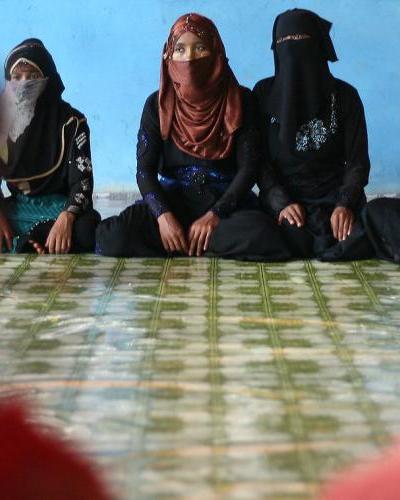International Day for the Elimination of Sexual Violence in Conflict - 19 June

"We must ensure technology supports our efforts to prevent and end these crimes, including by increasing access and holding people to account for their actions online." UN Secretary-General António Guterres message for the international day, 2023
Sexual harassment and gender-based hate speech
Every new wave of conflict brings with it a rising tide of human tragedy, including new waves of war’s oldest, most silenced, and least condemned crime - sexual violence. Conflict-related sexual violence, whether against women, girls, men, or boys in all their diversity, continues to be used as a tactic of war, torture, and terrorism amid deepening political and security crises, compounded by militarization and the illicit proliferation of arms.
New crises have multiplied as entrenched conflicts have deepened, resulting in shrinking civic space and rising reprisals against human rights defenders, activists, and journalists.
Sexual harassment and gender-based hate speech have surged in the digital space. While the use of information and communications technology has contributed to the empowerment of women and girls and other groups in vulnerable situations, its use has also enabled the propagation of violence.
In some settings, disturbing trends of gender-based hate speech and incitement to violence fuelled conflict in which rape and other forms of sexual violence are used to humiliate and destabilize targeted communities. Hate speech – including online – has become one of the most common ways of spreading divisive rhetoric on a global scale.
We must confront bigotry by working to tackle the hate that spreads like wildfire across the internet.” António Guterres
Information and Communications Technology (ICT) — a tool for empowerment... and destruction
Information and Communications Technology (ICT) may be used directly as a tool for making digital threats and inciting gender-based violence, including threats of physical and/or sexual violence, rape, killing, unwanted and harassing online communications, or even the encouragement of others to harm women physically.
On the other hand, ICT can be a powerful tool to improve gender equality and the empowerment of women and girls, contribute to building their resilience in times of crises, increase the prevention of sexual and gender-based violence, as well as help survivors fight against impunity and improve accountability.
A lack of access for women and girls to affordable, accessible, and reliable technologies remains a critical challenge in many countries. All efforts should be deployed to reduce the price and enhance the affordability of information and communications technologies and broadband access and use. More needs to be done in bridging the gender digital divide and ensuring technology is safe and accessible to all.
We must guarantee safe and equitable access to inclusive and quality education, including digital literacy for all.
International cooperation must be enhanced to counter increasing sexual and gender-based violence, harassment and hate speech occurring both offline and online, as these pose a real threat to democracy by weakening women and girls’ participation in society.
Background
Definition and prevalence
The term “conflict-related sexual violence” refers to rape, sexual slavery, forced prostitution, forced pregnancy, forced abortion, enforced sterilization, forced marriage and any other form of sexual violence of comparable gravity perpetrated against women, men, girls or boys that is directly or indirectly linked to a conflict. The term also encompasses trafficking in persons when committed in situations of conflict for the purpose of sexual violence or exploitation.
A consistent concern is that fear and cultural stigma converge to prevent the vast majority of survivors of conflict-related sexual violence from coming forward to report such violence. Practitioners in the field estimate that for each rape reported in connection with a conflict, 10 to 20 cases go undocumented.
UN Resolutions
On 19 June 2015, the United Nations General Assembly (A/RES/69/293) proclaimed 19 June of each year the International Day for the Elimination of Sexual Violence in Conflict, in order to raise awareness of the need to put an end to conflict-related sexual violence, to honour the victims and survivors of sexual violence around the world and to pay tribute to all those who have courageously devoted their lives to and lost their lives in standing up for the eradication of these crimes.
The date was chosen to commemorate the adoption on 19 June 2008 of Security Council resolution 1820 (2008), in which the Council condemned sexual violence as a tactic of war and an impediment to peacebuilding.
In response to the rise in violent extremism, the Security Council adopted resolution S/RES/2331 (2016), the first to address the nexus between trafficking, sexual violence, terrorism and transnational organized crime. Acknowledging sexual violence as a tactic of terrorism, it further affirmed that victims of trafficking and sexual violence committed by terrorist groups should be eligible for official redress as victims of terrorism.
2023 Event
Bridging the gender digital divide to prevent, address and respond to conflict-related sexual violence
10 a.m. to 11:30 a.m. EDT
Monday, 19 June 2023
Conference Room 1, UNHQ, New York
UN WebTV live webcast
Invitation card - save the date
Concept Note and Programme
Commemorating the 9th official observance, this year's event is co-hosted by the Office of the SRSG on Sexual Violence in Conflict, the Office of the SRSG on Children and Armed Conflict and the Permanent Mission of Argentina to the United Nations.
The purpose of the event is to stand in solidarity with the survivors, and those supporting them, to spark hope, knowledge and inspiration as we lift our voices to say: “#EndRapeInWar”.
This part of the article has been published in the United Nations' site in this link: https://www.un.org/en/observances/end-sexual-violence-in-conflict-day.









